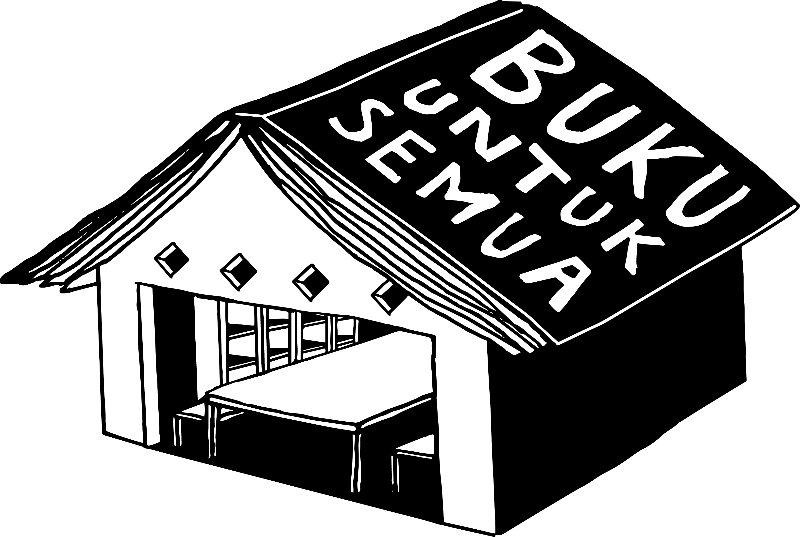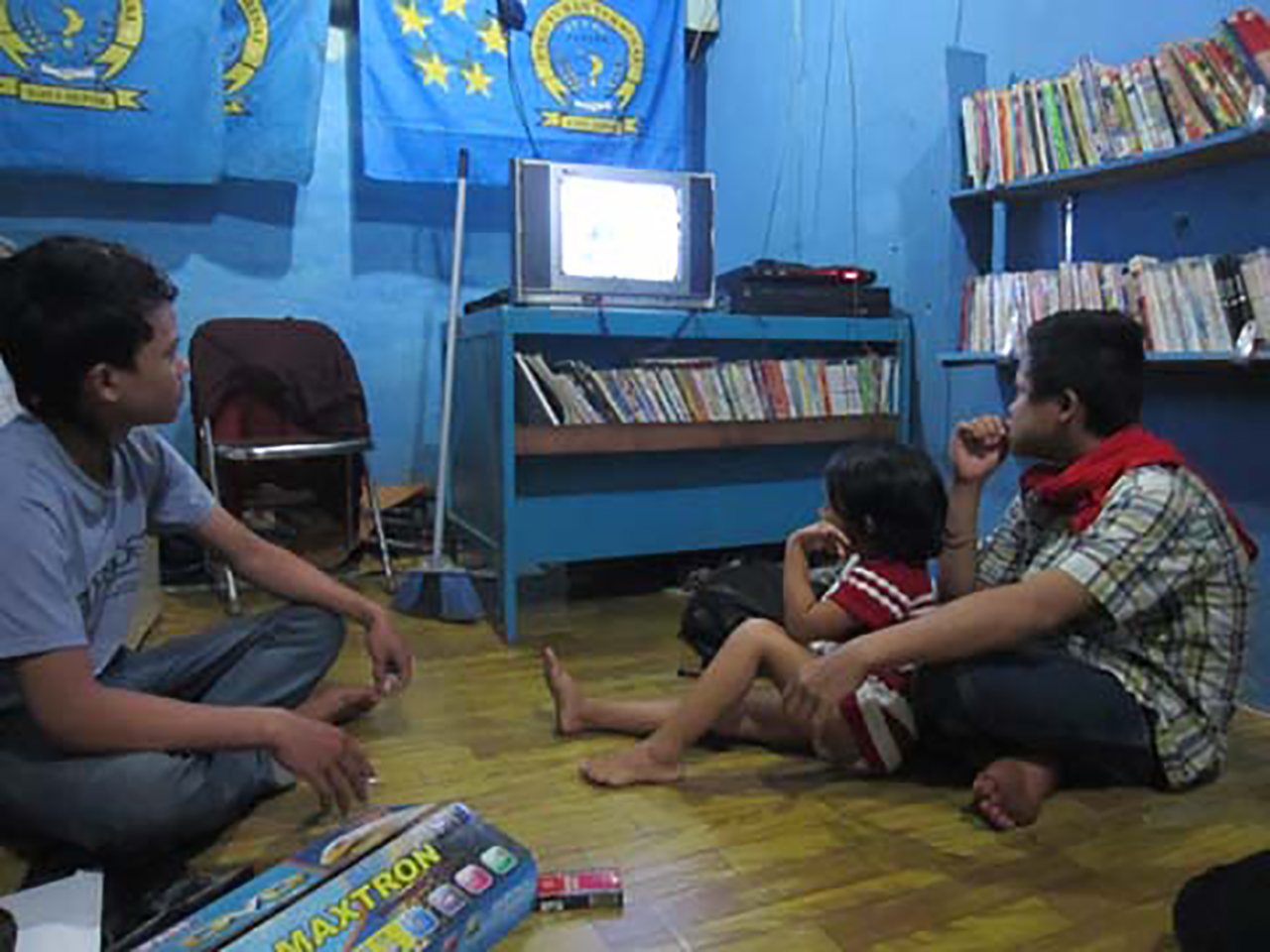
A Note On Reading
Author: Manshur Zikri
This article had been published at the AKUMASSA (24 Januari, 2012) entitled Reading the 'Reading'.
Baca versi bahasa Indonesia di sini
SOME RECOLLECTION RELATED to the word ‘reading’ crossed my mind when I sat in a red public transportation number 19 which ran slowly through the traffic jam on Margonda Street towards Depok Terminal on Tuesday afternoon January 17, 2012. In a semi-conscious state because of the drowsiness, vaguely I heard what my friend, Ugeng, had once said. Something like this: “Reading doesn’t always mean as the activity to see letters, words and sentences, and then pronounce them. ‘Reading’ can also be interpreted as an attitude or behavior to care more about what exists and happens around us.” Searching for information through the books or movies was an example of that attitude: observing what had existed and happened and/or was existing and happening in the place where we stood nowadays, and then did the action to respond to it.
***
The public transportation stopped around the terminal, exactly in front of a row of stalls such as coffee stall (warkop), Tegal’s stall (warteg), lapo stall and other shops. There was a small room with a glass door sticking out between those stalls. I had known this room for about a month. Panter Reading House was its name, or at least that was what written on the sign hung on one of its walls. My visit, together with two friends, intended to see that reading house.
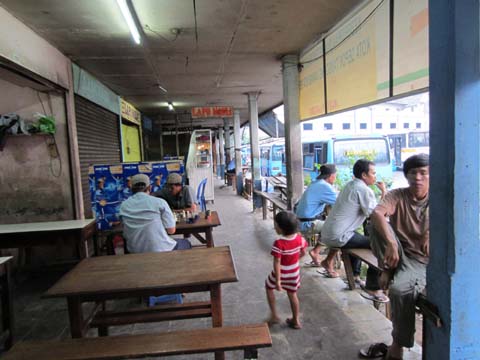 Getting off the public transportation, we – Lulus, who deftly lifted a box containing the donation of books and movies; Ageung, who carried a DVD player which would be donated too to complete the collection of Panter Reading House; and I, who carried a small digital camera, not to be donated, but for the documentation purpose – were greeted by the excited action from one of the young men of the reading house. He helped Lulus carrying that box to be put in a modest room which now had been transformed into a small tidier library. It was so much different from the first time I had come to that place.
Getting off the public transportation, we – Lulus, who deftly lifted a box containing the donation of books and movies; Ageung, who carried a DVD player which would be donated too to complete the collection of Panter Reading House; and I, who carried a small digital camera, not to be donated, but for the documentation purpose – were greeted by the excited action from one of the young men of the reading house. He helped Lulus carrying that box to be put in a modest room which now had been transformed into a small tidier library. It was so much different from the first time I had come to that place.
Honestly, that day was only the third time I visited the Panter Reading House, unlike Lulus and Ageung who went there more often to watch the elders, young people and school children’s daily activities in the terminal surroundings tidying the library. Of all the young men greeted us, I only recognized Bang Andi, a man with the thin haircut like a soldier, who seemed just woke up from his nap, woken up by the young man who helped Lulus carrying the box.
“I caught a cold because I got caught in the rain last night when I went back and forth handling the proposal and letters to the media partners and sponsors,” said Bang Andi as he invited us to sit on the floor, ordered three cups of coffee from the next door coffee stall, and then lit a cigarette. “Fortunately, there were boys who helped to massage me, now I’m better.” According to his story, in the past few days, the young men in the terminal, including him, and the college student volunteers from various universities who actively became the organizers of the reading house had been busy organizing the preparation of the inauguration event of Panter Reading House which would be held in the upcoming February 2012. They invited the important figures, including the Mayor of Depok who would inaugurate the reading house and the famous bands for the entertainment. There was a kind of intention from the organizers of Panter Reading House and PaguyubanTerminal (Terminal Community – Panter, who initiated the idea of that reading house) to make that event as lively as possible, but was still close to the people, to let people know about the presence of a reading house in Depok Terminal for the benefit of people in the terminal and in Depok City. The plan was that the event was also completed with a series of talk shows which would talk about the issue of children on the street which so far still escaped the government’s attention and protection.
“I also have a plan to play a short documentary movie at that event,” explained Bang Andi. “Do you think there was a good movie to be played?”
“Those ones, there are some movies and akumassa’s video works in the box for the reading house,” said Ageung. “If you want, you can play them at the event! We also give you some collections of movie from the world directors to be watched and also for learning.”
“Oh, really? Wow, thank you so much, Bro!” Bang Andi cried in delight. Then we opened the box together.
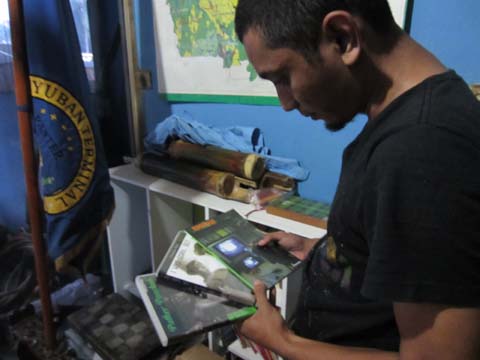 In the Depok akumassa workshop which had just been over a few days before, we had made the Depok Terminal as one of the video frames. During the research process and the filming at the terminal, Panter Reading House had been the favorite place to relax while enjoying the warm coffee in the afternoon and night, and also the place for us to shoot for making the video about the reading house itself. The children and the caretakers of the reading house also contributed in helping us by giving the information about the terminal and its people activity. Of all seven works that we had succeeded in completing, two of them were about the terminal, which was called “KPP” and “Terminal Belajar” (The Learning Terminal).
In the Depok akumassa workshop which had just been over a few days before, we had made the Depok Terminal as one of the video frames. During the research process and the filming at the terminal, Panter Reading House had been the favorite place to relax while enjoying the warm coffee in the afternoon and night, and also the place for us to shoot for making the video about the reading house itself. The children and the caretakers of the reading house also contributed in helping us by giving the information about the terminal and its people activity. Of all seven works that we had succeeded in completing, two of them were about the terminal, which was called “KPP” and “Terminal Belajar” (The Learning Terminal).
Because of that, we returned the favor of the Panter Reading House by donating the books and some movies, besides the motivation to share the knowledge with each other and the access to keep on learning. This was a way that could be done to respond to the positive things which were done by the terminal community in developing their potential. We, akumassaand the Panter Reading House had a big expectation to be able to realize the dream of the people who were media educated and realized the importance of the knowledge as the provision for establishing a better order of life.
“Is this the video?” cried Bang Andi when he saw the cover of Depok akumassa’s video. “Wow, I’m playing it right now, I’m curious to watch it!”
***
“…it’s rubbish if, for instance, there’s a person who admits that he or she can write or make a work well without reading at all,” another indistinct voice was heard, the one that had once been said by Hafiz, a social and culture activist, in a discussion about how to produce a good work. “Reading can be done through the experience, through what we have seen and heard, and so on. And then the knowledge from the reading becomes the foundation to make a good work, which is also supported by the high intensity factor to keep on trying.”
***
here was Agus Kurnia, who was usually called Abah Agus. He was the chairman of Paguyuban Terminal. Like what Lulus Gita Samudra had written in an article about Depok Terminal and Panter Reading House, and had been published on www.akumassa.org on Monday, December 19, 2011, Abah Agus had come from Garut, West Java. He had experienced all kinds of profession of people on the street, from children on the street, conductor, driver until finally became a resident of Depok Terminal. Now he was busy organizing the community. What he made as a provision to survive until he could gather the people to join the community called Panter was a life experience as an aku (I) who blended in a nameless massa (crowd) which was spread on the city streets.
In the past, indeed, Abah Agus had not been able to read the newspaper, but he had still ‘read’ the community where he had lived since 1990s when he decided to leave his home. Because of his tenacity in ‘reading’, he insisted on learning how to read the newspaper, then he had an urge to invite others in the terminal to read too. Panter Reading House had been initiated in 2006 Panter meeting, and then it had been realized at the end of 2011. “It’s never too late to learn!” said a proverb, considering there were always living people until the end of time as the unlimited reference source for us to keep on learning how ‘to read’.
“Hopefully, the presence of the Panter Reading House could help the young people here so they could be more productive and could produce useful activities for all,” said Abah Agus when he had been chatting with me on the first occasion we had met.
Yes, in my opinion, Abah had indeed ‘read’. By understanding the problem that had happened around him, he then had initiated an idea and together with his Panter friends produced a ‘work’ named Panter Reading House, which would definitely become useful and good for the people, particularly the terminal local community.
***
“What we have been doing all this time actually are reading and writing,” I also remembered the words from Otty, an activist who had been active in citizen journalism for a long time. “We read, hear, see, and collect the small narratives and events that are spread in the community, and then we record and pack them in various media, then we make them available to a lot of people as a useful knowledge product without any particular purposes other than for the educational purposes.”
***
About 8.3 million people of the total population of Indonesia were illiterate; 64 % of them were women and the rest were men (data was collected from Kompas online). Twelve per cent of the illiterate people lived in West Java (according to the data from Benni Setiawan in an article which had been published on http://www.bit.lipi.go.id/ on June 3, 2009). Considering this large number, of course, the problem about ‘the illiteracy’ became a very serious one. However, the budget issued by the government to solve this problem, like the one to build the TBM (Taman Bacaan Masyarakat – Public Reading Place), was relatively small. Like what the Kompas online had reported on September 8, 2011, the budget to build the TBM only ranged between 15 and 40 million IDR. This problem became more complicated by the addition of other factors which, in most cases, caused the people who had already been able to read became illiterate again because of lack of sustainable coaching from the responsible parties, and the limited facilities and infrastructure.
Of some sources that I had explored, the effort to eradicate the illiteracy had been done considerably by various state’s elements and non-governmental institutions, either at the national or international level. Recently, US Agency for International Development (USAID), Australian Agency for International Development (AusAID), World Vision, and United States Department of Education had held a kind of competition program worth 20 million USD which had a purpose to support the efficient and sustainable innovation which would increase the literacy of children in the developing country. Indonesia was no exception; the business people, Non-Governmental Organizations and the educational institutions within them had also been invited to participate in that global competition.
“We cannot ignore the people’s capacity to be moved by the kindness argument,” said Barbara Ward in Only One Earth, which had been quoted by Goenawan Mohammad in his “Catatan Pinggir” (marginal notes) article on June 20, 1981. Whatever the form of effort was, if that had the purpose to give the people a more prosperous life, we had to support it.
However, without an intention of being too skeptical, I wondered whether the efforts of those institutions outside people themselves became the only way to eradicate the illiteracy. Not to mention the certain interests from people who might harm their community. How could we produce the knowledge and information independently without the need to expect more and to depend on those big institutions, which might not understand the real problem that existed in the community? Was it possible for the lower class society, who was accused as the illiterate class, to make an independent attempt to increase their quality as a person and a part of the potential crowd? I was sure that thing could be done because I believed a human being basically had the ability ‘to read’, however the form was, and had the ability to do something to produce the good things for their own and other people.
Maybe what Panter Reading House and Paguyuban Terminal had done could become an example. Without having to hold out their hands for long to get the fund from the authorities, they created the learning area independently on their own initiative, through the mutual cooperation work and togetherness of the terminal community. Thus, they could produce the knowledge and created the access to their needs and rights.
***
Then, what was the essence if it was only to record or to write, in other words, to produce the things around us (people) only to be enjoyed by us (people) too? Hit by that question, I tried to look for another recollection to answer it. When the public transportation number 19 was getting close to the terminal, I remembered a sentence from Mahardika in his writing (published on www.jurnalfootage.net on January 5, 2012). “People are given the power to produce the knowledge or information which they want to deliver and play. This is not a kind of masturbation. It’s more like how they try to read their own needs.” People who acted to create the educational access for themselves, and then produced a work (in any form) to be consumed by themselves, actually were the individuals who were willing “to reflect on themselves and to think seriously about what they had done.” In other words, this was a self-criticism attitude of the people, an attitude that was rarely owned by the rulers in this country.
***
“Wow, there’s Paul!” shouted Bang Andi as he laughed happily when he saw one of the children on the street who actively studied at Panter Reading House was on TV. On that video show, of which the duration was less than 20 minutes, we were all entertained by Paul’s funny action when he was studying the numbers with Ririn (Abah Agus’s daughter). Paul’s real name was Maulana. “When you are studying, sit up straight and try to focus!” said Abah Agus to Paul in one scene on the “Terminal Belajar” video.
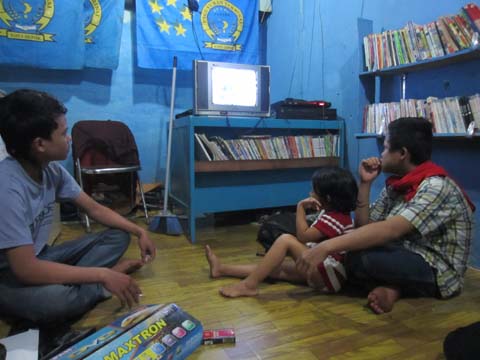 Not long after Bang Andi started to play that video, people began to come to liven up the atmosphere. The older men who usually hung out in the coffee stall next door gathered at the door of Panter Reading House, laughing and yelling happily watching the video recording about their ‘home’. The cries of “Wow, there’s (someone’s name)…!” or “Hey, that’s (someone’s name)!” did not stop until the end of the video. That video was even replayed a few times and they all enjoyed it.
Not long after Bang Andi started to play that video, people began to come to liven up the atmosphere. The older men who usually hung out in the coffee stall next door gathered at the door of Panter Reading House, laughing and yelling happily watching the video recording about their ‘home’. The cries of “Wow, there’s (someone’s name)…!” or “Hey, that’s (someone’s name)!” did not stop until the end of the video. That video was even replayed a few times and they all enjoyed it.
Ageung, Lulus and I felt very happy too, seeing the enthusiasm of the terminal community, particularly the members of Panter when they watched their own faces on television. At that moment, they were not watching the famous celebrities; they were the celebrities. They were not reading the information which was usually presented by the TV station; they devoured the information which came from their own daily life. They were ‘reading’ what happened around them.
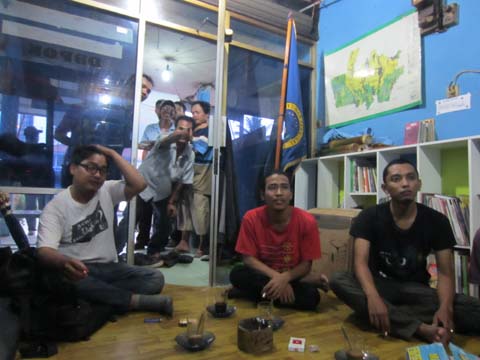 I, as one of the participants of Depok akumassa, was very happy to see firsthand the benefit of the community empowerment program that we had done and were doing.
I, as one of the participants of Depok akumassa, was very happy to see firsthand the benefit of the community empowerment program that we had done and were doing.
“This is the one that we would play on the inauguration, then, OK?” said Bang Andi. Lulus, Ageung and I agreed. However, the three of us promised to ourselves that the ‘reading’ and ‘writing’ about Depok City and Depok Terminal would not stop at that video work only, but would keep on going until there was nothing could be read anymore.
After watching that video, when the dusk was coming, we all took the books out of the box, and the caretakers of Panter Reading House began to arrange them on their simple bookshelves.
The meaning of ‘reading’ was very extensive. The value of the ‘reading’ activity was very noble and very useful when we could understand what the real ‘reading’ was. Some recollections about the word ‘reading’ swam in my head which started to feel heavy because the drowsiness was getting stronger. “Just here, Bang!” Ageung’s shout woke me up. Around 5 PM, we arrived at Panter Reading House to do a social activity which was expected to be able to give a benefit for the community. “This is the time to do what I’ve been thinking the whole time!” I grumbled silently.
***
